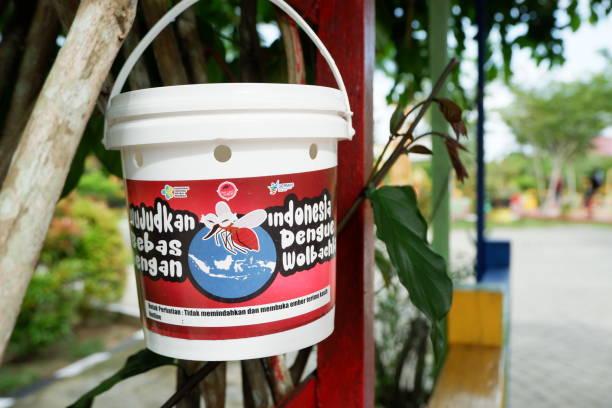Wolbachia shows how the technology of the “poor man” became a symbol of health governance and East-South cooperation.
In the folds of the fight against the most neglected tropical diseases moves a tiny and silent actor, a bacterium that lives inside the cells of insects and arachnids, and which for some years has begun to rewrite the relationship between science, development and power.It's called Wolbachia, and its story tells not only of biology and public health, but of geopolitical balances that are profoundly changing.
The problem is well known: every year thousands of people fall ill with dengue, and thousands die from bleeding complications or lack of access to proper treatment.The figures vary, but the most reliable estimates indicate more than 60 million symptomatic cases and hundreds of thousands of hospitalizations.The virus is transmitted by Aedes aegypti, the mosquito par excellence, which has adapted to tropical climates and the stagnant water reservoirs of the expanding suburbs.For years, prevention has depended on pesticides and clean-up campaigns, with lasting results.The mosquito resists, adapts, and tropical cities grow faster than control programs.
The breakthrough came from an idea that was as simple as it was brilliant.using natural bacteria to interrupt virus transmission.Scientists knew that Wolbachia, which is already present in many species of insects, interacts with the replication of several viruses inside the cell.Artificially introduced into the Aedes aegypti mosquito, the bacterium significantly reduces the ability to transmit the dengue virus, as well as other parasites such as Zika, Chikungunya and yellow fever.It is a kind of "biological vaccine" of the vector.
In 2021, a large randomized trial in Yogyakarta, Indonesia, demonstrated the effectiveness of the method at an urban scale: in areas where Wolbachia-infected mosquitoes were released, the number of virologically confirmed dengue cases decreased by 77% and the number of hospital admissions decreased by 86%.It was the first solid scientific evidence that biological vector control can achieve epidemiological results comparable to mass vaccination.The experiment marked a turning point and prompted several countries, from Brazil to Vietnam, to introduce similar projects on a growing scale.
But there is a much more complicated political picture behind health data.Wolbachia is not just a technical intervention: it is a technology that, once launched, is self-sustaining.The bacterium is passed from one generation of mosquitoes to the next, and over time it can spread continuously in the local population.This means that a tropical country with sufficient infrastructure can take care of its own health care, independent of foreign drugs or vaccines.In a world where health is also an effective tool and soft power, this is a small revolution.
Indonesia, for example, has built factories to produce millions of "cure" mosquitoes and integrate the strategy into its health system.In Brazil, the government has announced plans to protect more than one trillion people through a public biochemical business capable of producing tens of millions of mosquitoes a week.These are no longer experimental projects, but real industrial health policies with biotechnology, urban development and diplomacy.
The meaning of the meaning is clear.For the first time, the fight against the epidemic does not go through the chain of the northern country, but through written, flexible and flexible and more open knowledge about reproduction.Scientific knowledge is shared between universities, public programs and programs of many, such as the national program, which is compatible with regional and local authorities.Pastor, every country can adopt technology, release its mosquitoes and gradually free itself from the insistence of international programs.In practice, however, this process is not without flexibility: large-scale production requires money, Tab staff, responsible for networks and health management that can support this project over time.
Biological control based on Wolbachia opens up new issues of bioethics and public relations.Unlike genetically modified mosquitoes, those infected with Wolbachia are not transgenic, but the concept of "unleashed swarms of juicy mosquitoes" can cause distrust in communities.In Indonesia, the success of the project was linked to a broad social participation strategy: neighborhood meetings, volunteer training, door-to-door comments.Without trust, any startup program fails.Here the political fact is clear: science only works if it conforms to the social contract.
The economic aspect is no less important.According to cost-effectiveness models developed by the University of Melbourne, for every $1 invested in Wolbachia programs, $1.35 to $3.4 in health benefits could be achieved in the form of reduced health care costs and lost productivity.However, the initial cost of implementation may be high for low-income countries.It's a barrier that risks perpetuating a divide: Those who can fund and manage the program will gain autonomy over health care;those who cannot do so remain dependent on care and emergency intervention.Even so, health becomes the basis of geopolitical balance.
The success of Wolbachia does not eliminate risks and uncertainties.The duration of long-term protection, the possibility that the virus develops adaptation mechanisms or that environmental factors change the stability of the vitamin are still open questions.Scientists emphasize the need for continuous research, integrated research systems and international protocols to avoid ecological imbalances or alarming interpretations.But so far, in all cases where Wolbachia has been introduced, no major side effects have been observed either on the ecosystems or on other species.
In the bigger picture of global health, Wolbachia represents a political and cultural laboratory.It shows how "poor" technology can become a symbol of health governance and South-South cooperation.At a time when climate change is expanding the distribution area of mosquito vectors into previously temperate regions – such as the Mediterranean or southern Europe – even rich countries are looking with interest at this solution.The logic is no longer just to help the Global South, but to prevent the return of diseases that can become endemic even in the North of the Equator.
Soon, the success of Wolbachia can destroy the factors that cause the strength of the relationship.Until now, global health medicine has been affected by diseases and vaccines in a technological process that is controlled by technology.Now a widespread example is what is emerging, of principles related to the study and action between different countries and groups of people thinking about their lives.
The Geopolitics of Health is ultimately the Geopolitics of Enemies: between government and citizens, between north and south, between Science and politics.Wolbachia shows that the answer to diseases caused by captivity is already in captivity.The challenge will be to make this a tool for international health and to prevent these from becoming another guilty verdict between those who can be opened and those who continue to be shown.This is a small sign that perhaps the biology of both political and community and international society may find a way to reverse the trend of health inequality.








